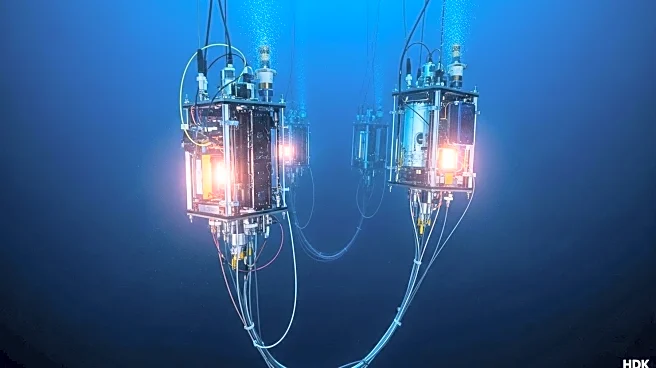What's Happening?
A team of physicists has deployed a neutrino sensor array, known as ARCA, on the Mediterranean seafloor near Sicily to detect highly energetic neutrinos potentially originating from cosmic explosions. The ARCA setup, part of the KM3NeT research rig, operates at a depth of approximately 3,500 meters, where it experiences intense pressure conditions. This deep-sea environment allows the sensors to be shielded from electromagnetic noise, enhancing their ability to observe neutrinos. The sensors are arranged in clusters along vertical strands, each 700 meters long, and are designed to detect and differentiate between three layers of particle noise: optical noise from radioactive decay, cosmic rays, and neutrinos from Earth's atmosphere. Recently, ARCA detected what is believed to be the most energetic neutrino to date, possibly from a cataclysmic event in the cosmos.
Why It's Important?
The detection of highly energetic neutrinos by ARCA represents a significant advancement in understanding cosmic phenomena. Neutrinos are elusive particles that can pass through matter with ease, making them difficult to study. By capturing these particles, scientists can gain insights into the processes occurring in distant cosmic explosions, potentially revealing new information about the universe's origins and behavior. This research could lead to breakthroughs in astrophysics and particle physics, offering a deeper understanding of the fundamental forces and particles that govern the universe. The ability to detect such energetic neutrinos also underscores the importance of innovative sensor technology and deep-sea research infrastructure in advancing scientific knowledge.
What's Next?
The ARCA project is expected to continue its search for energetic neutrinos, with scientists aiming to identify their sources and understand the mechanisms behind their creation. Future developments may include expanding the sensor array or enhancing its sensitivity to capture even more detailed data. The findings from ARCA could prompt further research collaborations and investments in deep-sea and particle physics research. Additionally, the scientific community may explore the potential applications of this technology in other areas, such as environmental monitoring or underwater exploration.
Beyond the Headlines
The deployment of ARCA highlights the challenges and opportunities associated with deep-sea research. Building infrastructure at such depths requires overcoming significant engineering and environmental obstacles, but it also opens new avenues for scientific discovery. The project's success could inspire similar initiatives in other fields, such as climate science or marine biology, where deep-sea environments offer unique research opportunities. Furthermore, the study of neutrinos may have implications for understanding dark matter and energy, potentially contributing to the broader quest to unravel the mysteries of the universe.











